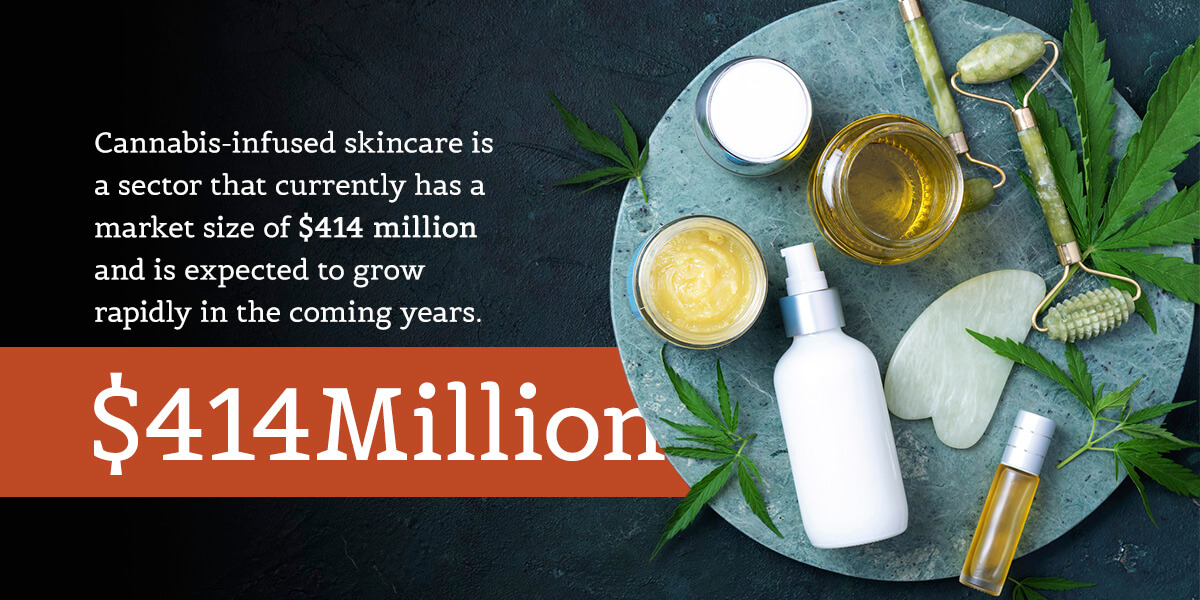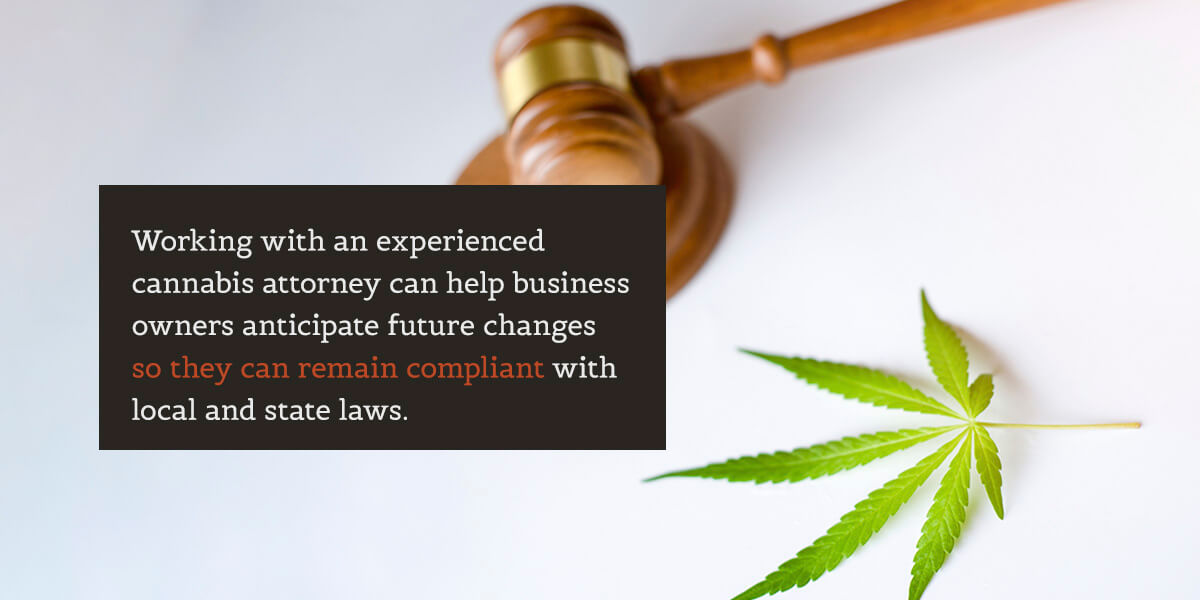Although cannabis remains illegal at the federal level, many states and municipalities have loosened their regulations. As of early 2023, 37 states have approved medical cannabis use by qualified individuals, and 21 states have approved it for recreational use.


As a result, the cannabis industry is growing at breakneck speed, especially when it comes to refined cannabis products. The edible market alone is projected to grow by $25.27 billion from 2020 to 2025 at a CAGR of 21.74%.
While this kind of growth is promising, entrepreneurs looking to take advantage of these cannabis industry opportunities must be aware of their legal responsibilities before getting started.
Business Opportunities in the Cannabis Industry
There are two main categories of cannabis businesses — plant-touching and ancillary. The legal requirements for each type are different, so it’s essential to research the laws around the company you want to start.
Plant-Touching Businesses
As the name implies, plant-touching cannabis businesses deal directly with the cannabis plant from seed to dispensary shelf. All plant-touching businesses must apply for a license to operate legally, and the licensing requirements can vary by region.
Some examples of plant-touching businesses include:
- Cultivation and breeding: Cultivators and breeders are essential parts of the industry. Note that licensing requirements for growing industrial hemp, which doesn’t contain significant concentrations of THC, are different from licensing requirements for THC-containing cannabis plants.
- Edibles: Many people prefer to eat or drink their cannabis, which is why edible manufacturing is such a promising business opportunity. Bakeries, candy companies and beverage manufacturers can get in on the trend in states where adult-use cannabis is legal.


- CBD cosmetics: Cannabis-infused skincare is a sector that currently has a market size of $414 million and is expected to grow rapidly in the coming years. For states where recreational use is still illegal, industrial hemp is a suitable substitute.
- Dispensaries: Dispensaries are the distribution hubs of the cannabis industry. Although each one has a different business model, they usually have a physical storefront where staff can assist customers in selecting products.
- Transportation and delivery: Every cannabis company needs to move its products throughout the supply chain, and third-party business-to-business transportation companies can turn a decent profit from this venture. Direct-to-consumer delivery is also legal in some states.
Depending on your state, you may need to obtain a license for each specific link in the supply chain, or you may need a general license.
Ancillary Businesses
Ancillary cannabis businesses include everything that doesn’t directly deal with the plant. Because you’re not dealing with the plant itself, you don’t need a license like you would for a plant-touching business.
Some promising ancillary cannabis business examples include:
- Cannabis accessories: You can produce or resell merchandise like bongs, pipes, apparel and other products to dispensaries or direct to consumers without a license.
- Digital marketing: Many states and social media companies have issued restrictions on the ways cannabis companies can advertise, which is why digital marketers are in such high demand in the industry. Experts in techniques like email marketing, SEO and content creation can be helpful for new companies.
- Consulting: Lots of people want to get into the industry, but few have the knowledge and expertise to be successful. That’s why consulting services can be incredibly helpful for aspiring cannabis entrepreneurs.
The Risks and Rewards of Starting a Cannabis Business
Some of the top risks involved with cannabis businesses include:
- Product liabilities: Although the industry is heavily regulated, cannabis is still an agricultural product. Just like with any other crop, cannabis growers and manufacturers must be careful to prevent issues like mold and bacteria growth from tainting their products.
- Supply chain: At the moment, cannabis companies can only transport products within their own states. Businesses are limited in their options for addressing product shortages and other supply chain issues.
- Financing: Because cannabis is still illegal at the federal level, most banks won’t provide loans to cannabis companies. Businesses need to secure funding through alternative means like angel investors and venture capitalists.
- Security: Due to its federal status, the cannabis industry is one of the few cash-only industries left in the United States. As a result, cannabis companies face an increased risk of theft.
For many, this risk is worth the reward due to the industry’s high potential for growth. Organizations that establish themselves now are likely to gain a competitive edge over later entrants.
Legal Considerations When Entering the Cannabis Industry
Here are some of the most important legal considerations you’ll need to make before starting your business.
Licensing
Before you can begin your business, you’ll need to get a license. Here are a few tips for finding licensing requirements in your state:
- Cultivating: Check with your state’s Department of Agriculture for more information about your area’s licensing requirements. If you want to grow industrial hemp, the U.S. Department of Agriculture website has additional resources for getting started.
- Manufacturing: Usually, you’ll need to obtain a manufacturing license to produce consumable products like cosmetics and edibles. These products must also comply with safety standards at the local and state levels. Checking your state’s Department of Health website is a good place to start.
- Dispensary: You must apply for a dispensary license from your state. However, different departments handle licensing in each state. Your state government’s website should help you determine which department you’ll need to apply to.
It’s important to note that some states limit the number of cannabis licenses available — this can bar many late applicants from obtaining the necessary license to start their businesses.
Vertical Integration
Some states require cannabis businesses to vertically integrate to keep companies out of the black market and keep consumer prices low. For example, Colorado’s former 70/30 Rule required cannabis retailers to grow at least 70% of their product.
Others ban vertical integration and mandate specialized licenses for each business. In these states, a dispensary can’t also operate a cultivation facility — this restriction is intended to prevent monopolies from forming so business remains fair.
Social Perception
Although it’s not a legal matter, the cannabis industry faces significant stigma due to long-held stereotypes. Regardless of whether someone uses cannabis for medicinal or recreational purposes, much of society still perceives them as lazy, unsuccessful and uneducated.
This stigma can make it more difficult to establish a reliable reputation in some states, which can harm your business potential.
Evolving Rules


Because the cannabis industry is still relatively new in most areas, legislation is constantly changing. Working with an experienced cannabis attorney can help business owners anticipate future changes so they can remain compliant with local and state laws.
What’s the Big Takeaway?
Ultimately, if you’re looking to break into the cannabis industry, you have plenty of opportunities. Staying up-to-date with evolving regulations will be critical, so seeking legal assistance can be invaluable for small businesses and entrepreneurs.
If you’re in the cannabis industry, we’d like to hear from you — what has your experience been like?
- SEO Powered Content & PR Distribution. Get Amplified Today.
- PlatoData.Network Vertical Generative Ai. Empower Yourself. Access Here.
- PlatoAiStream. Web3 Intelligence. Knowledge Amplified. Access Here.
- PlatoESG. Carbon, CleanTech, Energy, Environment, Solar, Waste Management. Access Here.
- PlatoHealth. Biotech and Clinical Trials Intelligence. Access Here.
- Source: https://harris-sliwoski.com/cannalawblog/cannabis-business-opportunities/



